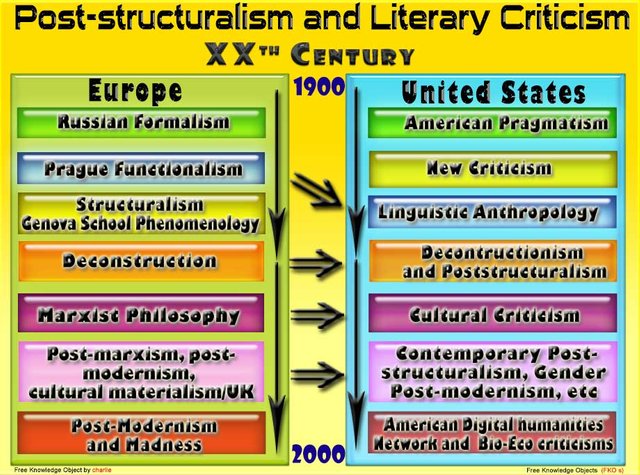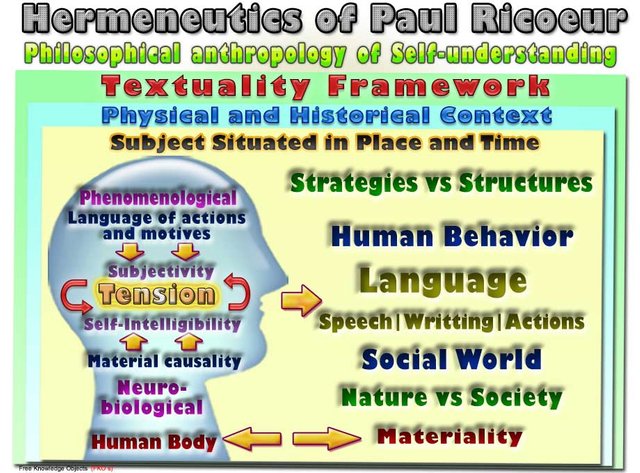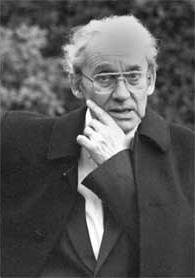Part 2 - The Short History of Existentialism: VI- Post Structuralists - Paul Ricouer
The Dialectics of Liberation: Anarchism, Existentialism, and Decentralism.
Part 2 - The Short History of Existentialism:
VI- Post Structuralists - Paul Ricouer
"When we start digging in our inner self, a revolution has began in the World" - charlie777pt
1 - Introduction
The best way to understand the genesis, the influences and the evolution of Post-structuralism, is by entanglement with the perspective of Literary Criticism of modern literature in the XXth Century, with the help of the picture below.

Europe in the in the second decade of the XXth century experienced the rise of the Russian Formalism, in the 30's the Prague School linguistic circle, and later the influences of the 50's Latin America neo-structuralism, creating basic methods of structuralist literary analysis, with further influence on Linguistics and Semiotics.
In the US, American Pragmatism, with the developments of Burke's "symbolic action" and Frye's theory of "archetypes" bringing a new criticism in literary works.
Later in the '60s, by the voice of Dell Hymes in "The Ethnography of Speaking", introduces Prague functionalism to American linguistic anthropology.
In the sixties in Europe structuralism appears with the Genova School Phenomenology, psychoanalysis and the Marxist Frankfurt School, to create the background for the emergence of Deconstruction, hermeneutics, and Lacanian psychoanalysis and later the French feminism theories.
These movements would reflect in US philosophy, with the birth of American Deconstructionism and Post-structuralism, while the line of the Marxist philosopher Althusser, gave us American Cultural Criticism.
Althusser also influenced French/European post-marxism, postmodernism and cultural materialism in the UK, that would serve as the base for American Contemporary Post-structuralism with post-modernism and cultural criticism and well as the theories of multiculturalism, gender and postcolonialism.
These movements had continuity in our century with the actual American Digital humanities, and the network and bio & eco criticisms.
In the end of the XXth century, in Europe we see the post-modernist view of society as the generator of increasing human psychological instability and symptoms of schizophrenia and paranoia in post-industrial societies, mostly with Louis A Sass's work Madness and Modernism_Insanity in the Light of Modern Art Literature and Thought to explore the relation between mental illness with post-industrial modern culture.
"There are no facts, only interpretations." - Friedrich Nietzsche
The dehumanizing effects of technology are disrespecting human values and rights and the planet, on our increasingly data-driven reality shaping conformist behaviors and the greedy consumerism, and the only escape is to go through our deep inquiry into the nature of existence, suffering, and our true inner self, to grow our consciousness in practical action.
As I commented recently in a post, The Known and Unknown of our deep selves stuck in the web of power's reality structures maybe can be the never-ending fight between our Conscious (David) and our Unconscious (Golias) being the Subconscious is the battlefield. where freedom is forged.
In an interdisciplinary view, maybe looking to recent studies, we can now connect alterity and behavior, with the physiology and neuroscience concept of neuroplasticity, meaning the brain changes his structure happening every time you learn new things, or have an insight, but long therm structures in the brain only grow by discipline and practice.
|
Paul Ricoeur was a 20th-century post-structuralist hermeneutic philosopher, with a vast work, a hunter of the meaning of life and the inner tensions of human beings to find self-intelligibility and most important self-esteem, search for eternal question of who we are, and what are we doing here."The Truth is hidden in the tensions of our Self." - charlie777pt
Besides being a Christian, he avoids the theological conceptualization in his philosophical paradigms.
“What one man calls God, another calls the laws of physics." - Nikola Tesla
His early influences where the classic Aristotle, Kant, Hegel and Heidegger, that are the basis to formulate his theory.
For him, the subject is always in a situation, and he saw human subjectivity in the primacy of language, intermediated by symbols, where self-understanding is a fictional act of interpretation through imagination.
"The text is a limited field of possible constructions." - Paul Ricoeur

Self-understanding subjectivity, is the main focus of Ricoeur's philosophy, a kind of the anthropology of the subject, always inside one historical context, a place(physical), embedded in a social framework, and in the axis of time (date).
His hermeneutics analyses the textuality framework to find meaning in speech, written text, and acting, for a more meaningful life in our actual alienated post-modern society.
"There's no reality except the one contained within us. That's why so many people live an unreal life. They take images outside them for reality and never allow the world within them to assert itself." - Hermann Hesse
Ricouer wants to find a way to scrutinize the Self in the ontological tensions between our neurophysiological nature and the social animal, as well as, the conflict between material causality and the language expressed by our motives and actions, and that philosophy should be the way to find and express this inner nature that reveals and hide in discourse.
"The narrative constructs the identity of the character, what can be called his or her narrative identity, in constructing that of the story told. It is the identity of the story that makes the identity of the character." - Paul Ricoeur
Our existence is our Destiny, always constrained by materiality, norms, and social rules, and by our Fate to get old and die, creates inner tensions with our biological nature and needs, our philosophical and ethical values and principles, where we are the wizards of intelligibility of our selves.
Our inner tensions, sure have reflexes in our anxiety, so we must be vigilant to be able to find a method to reveal the real human being and find stability and coherence in the sense and meaning of life, as Ricoeur tried to show us.
"Wisdom finds its literary expression in wisdom literature." - Paul Ricoeur
3 - Conclusion of the Post-structuralism series
Here ends the small series on post-structuralism, to finally enter into the great figures who exposed and made existentialism as the philosophy of the twentieth century. to which we will dedicate the next posts.
In the last century it was said that curious cats ended up dead, but in this century, we have to realize that a cat that is not curious will be quickly eliminated.
Philosophy is the eternal shaping of human creation and breakthroughs in collective knowledge, where every cognitive assumption is a product of previous philosophical challenging, thinking and discussion to strip reality.
Philosophy is being curious to question reality and ourselves, and the swiss knife tool to deal with the World and ourselves, the creation of innovative knowledge and new technologies/products, or ground-breaking scientific paradigms.
Any product, technique or scientific paradigm, it is always a result of a pre-philosophical questioning, as a process of deconstruction of reality to find the inner structures and entities of any phenomenon.
To manufacture a product like a bottle, or a system like the Steemit blockchain, there is always a long phase of philosophical discussion, which today is called design and strategy, which in the end is translated by final the final work, which is no more than the reflex of the philosophical dialectic of questioning reality.
The dialectical reality of Existence and our Essence is an eternal question, without static answers as the truth except for the act of continuing to question.
Cognitive (to know) and Self-knowledge (feelings and emotions) reduce the anxiety of the growing uncertainty in actual society's augmented and accelerated reality.
Intuition and the Imaginary are forces to break the chains of power in Humanity, by drilling in the layers of our imprisoned Selves in the web of reality.
The Known and the Unknown of our deep selves dealing with power's reality structures is the fight between our Conscious (David) and our Unconscious(Golias) where the Subconscious is the battlefield.
Almost everything has already been written and said about inner liberation as the most effective form of social transformation.
Philosophy, literature, the arts, and a science with consciousness, were created by characters who have fully anticipated the degradation of the present materialistic society, in which Man has already been bandaged and chained to walk to a dead end, where it is at risk the survival of the species itself, in the name of power and money in the hand of executioners of the human condition and of the planet itself.
Tools are not lacking for the liberation of humanity, what is lacking is people realizing that they are a condition for survival.
Short Video: HERMENEUTICS Paul Ricoeur
Paul Ricoeur: Death and Eternity (English Subtitles)
4 - Addenda
For example, Industrial music, that I will dedicate a post on this series, is an activist musical movement, with a taste of pos-Marxism and post-structuralism, expressing the deconstruction of power in reality, and the language's games unconscious structure, implemented in our brains, by the modern noisy media streaming and data-driven society, that is well-expressed in this form of art that can be used to drain and restructure our fields of consciousness.
The next track of the industrial music band, Test Dept., that shows how we can twist language in contrasting contexts, that intends to exorcize the machine that possessed us, like an invisible ghost that impregnates and obfuscate our personal values.
Test Dept. - New World Order (1990)
Part of the lyrics are by Bush Senior(42) that is now in skull'n'bone
Photo source: Wikipedia
The Dialectics of Liberation: Anarchism, Existentialism, and Decentralism.
Published Posts:
Introduction to the Dialectics of Liberation: Anarchism, Existentialism and Decentralism
I - Anarchism
- What is Anarchism?
- The History of Anarchism
- Part 1 - Pre-Anarchy - Social Revolution
- Anarchy: Revolution Against The State
- Anarchy Today
- Index and Conclusions of part 1 - Anarchy
II - Existentialism
- What is Existentialism ?
- Part 1 - Unplugged Introduction to Existentialism
- Part 2 - The Short History of Existentialism: I - Early Pre-existentialism
- Part 2 - The Short History of Existentialism: II - Pre-Existentialists
- Part 2 - The Short History of Existentialism: III - Phenomenology - Brentano to Husserl
- Part 2 - The Short History of Existentialism: III - Phenomenology - Jaspers to Sheller
- Part 2 - The Short History of Existentialism: IV - Humanistic Existentialists - Buber, Arendt, and Tillich
- Part 2 - The Short History of Existentialism: V - Humanistic Existentialists - Rollo May
- Part 2 - The Short History of Existentialism: V - Humanistic Existentialists - Abraham Maslow
- Part 2 - The Short History of Existentialism: VI - Post -Structuralism - Jacques Lacan
- Part 2 - The Short History of Existentialism: VI - Post -Structuralism - Michel Foucault
- Part 2 - The Short History of Existentialism: VI - Post -Structuralism - Emmanuel Levinas
- Part 2 - The Short History of Existentialism: VI - Post -Structuralism - Jacques Derrida
- Part 2 - The Short History of Existentialism: VI - Post -Structuralism - Paul Ricouer- This post
Next posts on the Series:
II - Existentialism(Cont.)
- What is Existentialism ? (Cont.)
- Part 3 - The Philosophy of Existentialism: I - The Meaning of Nonsense
- The "Existentialists"
- Part 1 - The Players and the Times
- Part 2 - Jean Paul Sartre - the Man of The 20th Century
- Part 3 - Simone de Beauvoir, the Castor
- Part 4 - Albert Camus - the Absurdist
- Part 5 - Merleau-Ponty
- Part 6 - Gabriel Marcel
- Humanism and Existentialism
- Part 1 - The Fear of Freedom of Erich Fromm
- Existentialism and Anarchism
- The Future : Posthumanism, transhumanism and inhumanism
III - Decentralism
- What is Decentralism?
- The Philosophy of Decentralism
- Blockchain and Decentralization
- Anarchism, Existentialism, and Decentralism
IV - Dialectic for Self-Liberation
- The Dialectics of Liberation Congress
- Psychedelics, Libertarian and artistical movements
- The Zen Buddism of Alan Watts
- Psychoanalysis and Existentialism
- The Anti-psychiatry movement
 2 - Paul Ricouer (1913-2005)
2 - Paul Ricouer (1913-2005)
This story was recommended by Steeve to its users and upvoted by one or more of them.
Check @steeveapp to learn more about Steeve, an AI-powered Steem interface.
Resteemed!!!
This post was upvoted by SteeveBot!
SteeveBot regularly upvotes stories that are appreciated by the community around Steeve, an AI-powered Steem interface.
thanks for the good post
Hi Sergey
Thanks and a happy year 2019
Cheers
Posted using Steeve, an AI-powered Steem interface
Este post recebeu 5.00% de upvote da conta @steemitportugal!

Obrigado por fazeres parte da comunidade @steemitportugal .